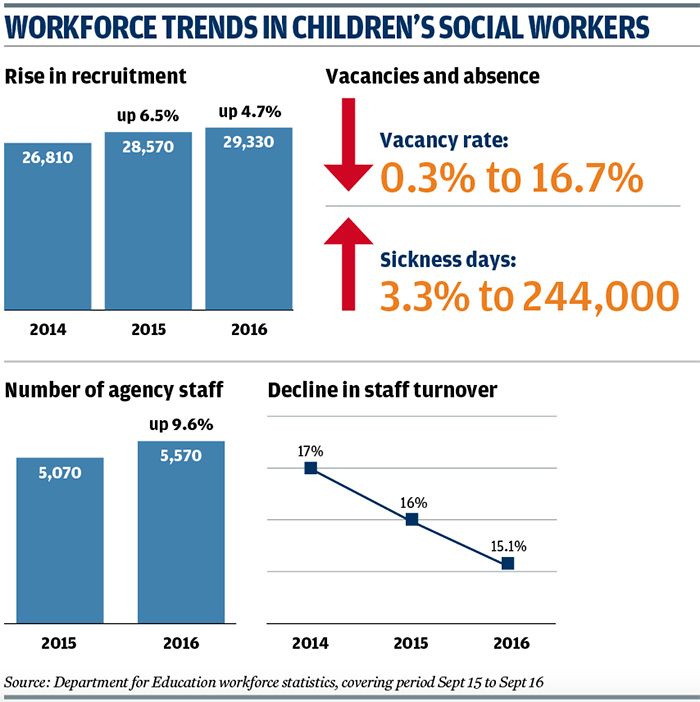Social work employment trends
Derren Hayes
Tuesday, February 28, 2017
ADCS's Rachael Wardell responds to five key developments in the children's social work workforce.

Latest Department for Education workforce statistics on children's social workers show that between September 2015 and September 2016, the number of practitioners employed by local authorities and agencies rose, turnover of staff employed by councils fell, and vacancy rates remained largely static (see graphics).
Rachael Wardell, director of children's services in West Berkshire and chair of the workforce development committee at the Association of Directors of Children's Services, assesses the factors behind these key trends and what they say about the health of the sector.
1. Social worker recruitment rises
"Each local authority is grappling with its own challenges around recruiting and retaining social workers, and despite our best efforts, we still need to recruit more into the profession to meet the increased level of demand for our services. The 4.7 per cent increase in the number of social workers is positive and is, in part, down to local authorities actively recruiting more social workers. But there has also been a significant investment locally, regionally and nationally in trying to recruit more people through routes such as Frontline and teaching partnerships."
2. Vacancy rates plateau but sickness days remain high
"We know that social work is an emotionally demanding role and that the level of burnout among professionals is high. This can result in individuals leaving the profession both temporarily and permanently. While authorities are committed to ensuring that social workers are well supported in their role, this is increasingly difficult to do at a time when demand for services soars, and resources and budgets are severely depleted. Social workers are also rarely recognised for all the positive work that they do. Unless we change this narrative, social work will never have the high status it truly deserves."
3. Use of agency staff increases
"One hypothesis for this trend could be that there are more non-local authority organisations, such as trusts, now delivering statutory social work, and therefore the agency workforce is deployed across a wider range of non-authority organisations than previously. But without more detailed data to analyse, it is not possible to be clear about whether this is a trend, let alone what is causing it."
4. Variation in caseload levels
"Social care cases vary in their complexity and so it is difficult to draw useful comparisons when looking at caseloads by number. A range of factors are taken into consideration when allocating cases to workers including complexity, risk and years of experience. It is in the best interests of the children and families we support that social workers, especially those newly qualified, are not overwhelmed by their workload. And as demand for services continues to grow, it is vital that social workers are given appropriate supervision, guidance and training to ensure that caseloads are manageable."
5. Staff turnover falls but most of those who leave jobs have been in post less than two years
"Both new and more experienced practitioners need support through things such as regular, reflective supervision. Ongoing training and development opportunities are a crucial part of ensuring that social workers can continue to do their jobs well. New and more experienced social workers will often make a swift decision about whether or not their current employer suits them, and the volatile social work market enables those who want to move on quickly to do so. But 40 per cent of social workers leaving had been in post for more than five years, which is a positive thing in a volatile market."





